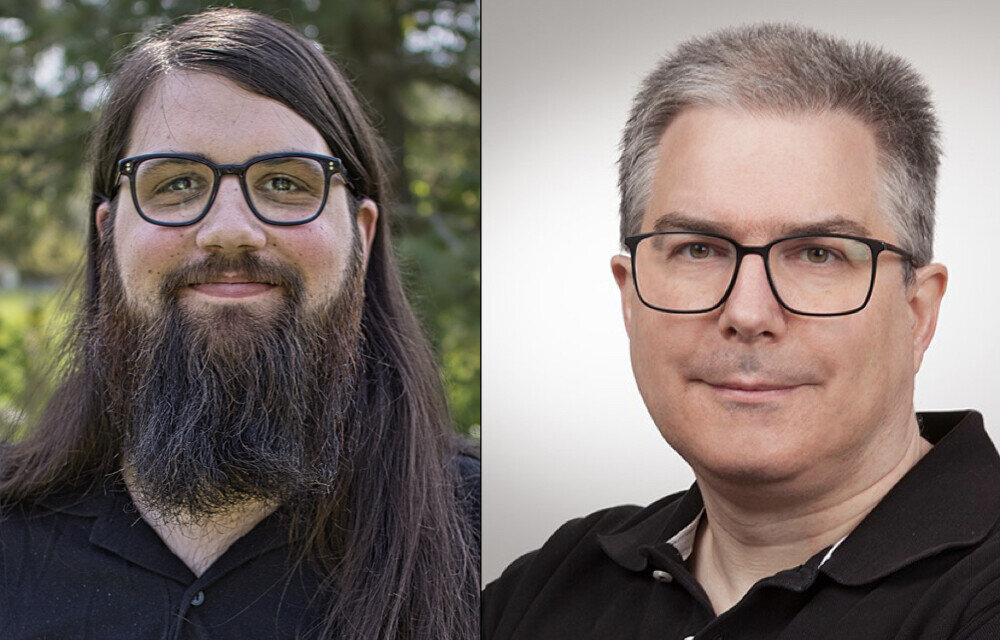Saarbrücken computer scientists honored with ACM Software Systems Award

Bernhard Schommer (left) and Michael Schmidt (right), the Saarbrücken Awardees of the ACM Software Systems Award . Photo: AbsInt
The Saarbrücken computer scientists Michael Schmidt and Bernhard Schommer, together with five colleagues, were honored with the internationally renowned “ACM Software Systems” award for the development of a highly secure compiler. Previous winnersof the award include the developers of the “UNIX” operating system, the “World Wide Web” or the developer of the “JAVA” programming language. The prize is awarded annually since 1983 and is sponsored by IT-company IBM with 35,000 US dollars.
Michael Schmidt and Bernhard Schommer are both employees of the Saarbrücken-based “AbsInt Angewandte Informatik GmbH”, which was co-founded in 1998 by Saarbrücken computer science professor Reinhard Wilhelm. Michael Schmidt is a former student of Reinhard Wilhelm at Saarland University, where Bernhard Schommer is currently pursuing a PhD in computer science.
Together with five other colleagues, Schmidt and Schommer were now honored by the world’s largest association in computer science, the “Association for Computing Machinery (ACM)” for their work on the “CompCert” compiler. A compiler can be described as a translator, that translates the code written by a programmer into the machine language of zeros and ones that computers can understand. “CompCert is the first industrial-strength compiler for the ‘C’ programming language for which a mathematical proof of correctness exists. As in, for which it is therefore proven that the translation of programs from the programming language ‘C’ into the machine language is guaranteed error-free and always corresponds exactly to what the programmer wrote,” explains Reinhard Wilhelm, professor emeritus of computer science of Saarland University and co-founder of AbsInt.
These unprecedented security guarantees have ensured that “CompCert” has found great acceptance in the industry and is now used in highly safety-critical systems, for example in the aviation industry or in nuclear power plants.
Today, CompCert continues as a research project at INRIA, the French National Institute for Research in Digital Science and Technology. Other researchers build on CompCert, and multiple corporations use it in the development of their safety-critical applications. AbsInt offers commercial licenses, provides industrial-strength technical support and maintenance, and actively contributes to further advancement of the tool.
The ACM Software System Award is presented to an institution or individual(s) recognized for developing a software system that has had a lasting influence, reflected in contributions to concepts, in commercial acceptance, or both. The 2021 ACM Software Systems Award recipients in detail:
- Xavier Leroy, Collège de France;
- Sandrine Blazy, University of Rennes 1, IRISA;
- Zaynah Dargaye, Nomadic Labs;
- Jacques-Henri Jourdan, CNRS, Laboratoire Méthodes Formelles;
- Michael Schmidt, AbsInt Angewandte Informatik GmbH;
- Bernhard Schommer, Saarland University / AbsInt GmbH;
- Jean-Baptiste Tristan, Boston College.
/pzs
Further infomation:
https://awards.acm.org/software-system
https://www.absint.com/compcert/
Press Contact:
Philipp Zapf-Schramm
Saarland Informatics Campus
Telefon: +49 681 302-70741
E-Mail: pzapf@mmci.uni-saarland.de
Background Saarland Informatics Campus:
900 scientists (including 400 PhD students) and about 2100 students from more than 80 nations make the Saarland Informatics Campus (SIC) one of the leading locations for computer science in Germany and Europe. Five world-renowned research institutes, namely the German Research Center for Artificial Intelligence (DFKI), the Max Planck Institute for Informatics, the Max Planck Institute for Software Systems, the Center for Bioinformatics and the Cluster for “Multimodal Computing and Interaction” as well as Saarland University with three departments and 24 degree programs cover the entire spectrum of computer science.
